The Play's the Thing
A Class Project Projects Shakespeare
Through the Minds of High Schoolers
Brooklyn Technical High School, New York, N.Y
Wednesday, January 9, 2013, front row orchestra
Taught by Emily Tuckman
For the students on stage, it was a final exam; they were being graded. For the students in the audience, it was something different from their regular classes; they were somewhat confused. For the teacher, it was a fivefold challenge as her five drama classes produced 30-minute versions of five Shakespeare plays; she was a multiplex of emotions that at the end of the day rested in proud relief.
For me, it was a full day observing Shakespeare come to breathing life among teenagers, those playing his words and those watching. Though the plays were abbreviated and the actors untrained, I watched a top-tier Rosalind, I felt real pain for Claudio, I understood greater textures in Othello (here recast as Othella), and I finally, finally saw a Hymen that made sense.
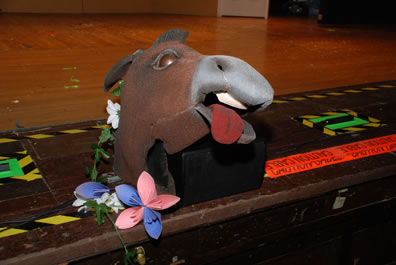
Bottom's head, used in A Midsummer Night's Dream, came from teacher Emily Tuckman's personal stock of old theater props. The student set designers made the flowers, which were scattered across the Brooklyn Technical High auditorium's stage for their production. Photo by Eric Minton.
The daylong event, that Brooklyn Technical High School drama teacher Emily Tuckman called "The Play's the Thing," played out in that school's awesome auditorium. Seating 3,000, it's the second largest theater in New York City and easily one of the most inspiring, with classic terra cotta trim, Ottoman windows, and chandeliers, plus acoustics that aided the most timid projections of shy or uncertain actors. Tuckman assigned the plays—Much Ado About Nothing, Hamlet, Othello, As You Like It, and A Midsummer Night's Dream—according to the talents and personalities of each class. However, other than coaching and one-on-one tutoring (plus providing some of the costumes and props from her and her friends' closets), she stepped aside. The students in each class, all seniors, formed their own theater companies and filled the ranks as directors, set and costume designers, and dramaturgs. They even printed their own programs.
Thus, it was the students who came up with the settings: a New York mafia family for Hamlet; Othella serving as a general in the Don't Ask, Don't Tell 1990s (and preparing to take her unit to Kuwait); As You Like It turning the Forest of Arden into a hippy commune. That play's dramaturgs gleaned parallels between the banished lords and the antiestablishment flower children of the late 1960s. Granted, teens in 2013 have a take on the '60s that doesn't quite jibe with the memories of those of us who were there, but their insight—whether intentional or by chance—put Hyman in a perfectly suitable context. Can't you just see some flower-bedecked, guru-like guy showing up as the mythical god of love and marriage to perform pseudo-union ceremonies for a bunch of hippies? I saw it, and it works.
Tuckman's only rule was that the students could not change Shakespeare's texts, with allowances for altering "Moor" to "Butch" in Othello and Boratio telling us there is something rotten in the city of Brooklyn rather than the state of Denmark in Hamlet (Boratio, by the way, is "Black Horatio," an extended version of Marcellus who teams with Horatio to serve as young Hamlet's henchmen and bodyguards). The troupes use Nick Newlin's condensed texts, with narrators filling in some of the gaps. Understandably, 40-minute classes could not put on full versions of the plays, but the abbreviated texts were the only major demerit of the productions. A Midsummer Night's Dream starts in the middle of the play with the lovers' quarrel; we lose all context of why and how the lovers got there, why Bottom wears an ass's head, and why Oberon causes Titania to fall in love with that ass-headed Bottom. Jacques' Seven Ages of Man speech in As You Like It jumps from the introductory couplet to the last age, making it a speech sans everything.
Several other classes—mostly from the English department—attended the plays (as did some students straggling in during their lunch hour). Thus, each performance played to an audience of some 200 students, their teachers, and a handful of parents and guests. At the end of each performance, the acting troupe took questions from the audience. It was in these questions that confusion wrought by the abbreviated texts emerged. Nevertheless, students in the audience seemed to comprehend the language. They snickered at some of the miscues, hooted at romantic situations, and gasped at the occasional fights and gunshots, but they also laughed at many of the comic lines and situations and sat in rapt quiet when tragic tension mounted. The biggest audience reaction came when Rosalind tells Phebe, "Sell when you can, you are not for all markets" in As You Like It. Shakespeare wrote that more than 413 years ago, but teen-agers in Brooklyn appreciate a good slam of any age. In the Q&A session after Othello, one student asked if they used "butch" in place of the n-word; that says as much about cultural contexts of race and gender identity today as it does about Shakespeare's timeless depiction of the tension of difference.
Experiencing Shakespeare is not just about great actors and clever directors and designers blowing us away with their skilled presentations of Shakespeare's talents. At any level—even the most basic amateur level as exhibited in this day's productions—it's about what the individual or collective brings from their own life experiences to Shakespeare's lines and characters and, in turn, makes Shakespeare relevant to our own life experiences. Every staging of a Shakespeare play offers something new or insightful. This becomes obvious from the outset of the day's first play, P2 Production's Much Ado About Nothing. When Beatrice (Dominica Wolinski) asks the messenger (Xiao Ye) how many men has Benedick killed and eaten in these wars, Ye begins counting on her fingers the number of men Benedick has killed and, presumably, eaten. Beatrice obliviously rants on.
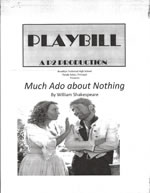 Alex Gibbons plays Benedick with suaveness. He's a player who thinks all women should be entranced by his obvious charms (though he's bound to discard those women sooner than later), but Beatrice seems immune to him. He presses her with an attitude that she should be sorry for what she's missing. In the gulling scene, he tries to hide by pretending to be a bench, one leg extended, and we get the physical comedy of Don Pedro (Jawad Hussain), Leonato (Sofia Degtyar), and the linebacker-sized Claudio (Sean Clune) sitting on him as they talk of Beatrice's supposed love for him. This Benedick takes everything as a lark until, after the aborted wedding, Beatrice asks him to kill Claudio, and Gibbons' Benedick breaks out laughing, thinking she's made a joke. When he realizes she's serious, it's the moment this Benedick grows up. Hussain plays an exuberant Don Pedro, whether he's accepting Leonato's hospitality, punking Benedick, or backing Claudio's anger at Hero. But the transcendent moment of this production belongs to Clune. Though the expunged text removes much of the context for Claudio's public repudiation of Hero at their wedding, Clune brings real personal hurt to the scene. I've never seen Claudio portrayed as anything but rash and immature—at the least, self-centered, and bullying at the worst—but Clune gives us a Claudio who truly feels betrayed by the woman he loves to infatuation, and his anguished eruption stabs our own hearts and engenders our sympathy.
Alex Gibbons plays Benedick with suaveness. He's a player who thinks all women should be entranced by his obvious charms (though he's bound to discard those women sooner than later), but Beatrice seems immune to him. He presses her with an attitude that she should be sorry for what she's missing. In the gulling scene, he tries to hide by pretending to be a bench, one leg extended, and we get the physical comedy of Don Pedro (Jawad Hussain), Leonato (Sofia Degtyar), and the linebacker-sized Claudio (Sean Clune) sitting on him as they talk of Beatrice's supposed love for him. This Benedick takes everything as a lark until, after the aborted wedding, Beatrice asks him to kill Claudio, and Gibbons' Benedick breaks out laughing, thinking she's made a joke. When he realizes she's serious, it's the moment this Benedick grows up. Hussain plays an exuberant Don Pedro, whether he's accepting Leonato's hospitality, punking Benedick, or backing Claudio's anger at Hero. But the transcendent moment of this production belongs to Clune. Though the expunged text removes much of the context for Claudio's public repudiation of Hero at their wedding, Clune brings real personal hurt to the scene. I've never seen Claudio portrayed as anything but rash and immature—at the least, self-centered, and bullying at the worst—but Clune gives us a Claudio who truly feels betrayed by the woman he loves to infatuation, and his anguished eruption stabs our own hearts and engenders our sympathy.
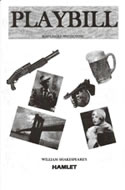 Hamlet becomes a story of godfathers, mafioso executions, and criminal intrigue in the hands of Bootlegger Productions. Ramy Ibrahim plays the titular character as a young man in much pain, a huge hole in his heart from the death of his father, and seething anger at his uncle Claudius (Sidney Ogunsekan) for taking over the family business and marrying his mother. When Claudius clasps Hamlet on the shoulder before exiting in the first scene, Ibrahim disgustingly brushes his uncle's lingering presence from his shirt and then launches into his "Too, too solid flesh" soliloquy. Ibrahim's is a machismo Hamlet, especially as he berates Ophelia (Antoinette Claps) to go to a nunnery and as he plays the fencing contest with an intense Laertes (Mustapfa Hydara).
Hamlet becomes a story of godfathers, mafioso executions, and criminal intrigue in the hands of Bootlegger Productions. Ramy Ibrahim plays the titular character as a young man in much pain, a huge hole in his heart from the death of his father, and seething anger at his uncle Claudius (Sidney Ogunsekan) for taking over the family business and marrying his mother. When Claudius clasps Hamlet on the shoulder before exiting in the first scene, Ibrahim disgustingly brushes his uncle's lingering presence from his shirt and then launches into his "Too, too solid flesh" soliloquy. Ibrahim's is a machismo Hamlet, especially as he berates Ophelia (Antoinette Claps) to go to a nunnery and as he plays the fencing contest with an intense Laertes (Mustapfa Hydara).
The company engages in some interesting stage business in this Hamlet. The courtiers, especially Polonius (Terrence Busby Jr.), look on Hamlet disapprovingly in the opening scene; we see, perhaps, why the election fell to Claudius. The Player King and Queen (Anthony Darand and Daniela Castro, respectively), along with Jonathan Negron as the Poisoner (their dumb show was mesmerizing), run off stage with sly grins after Claudius interrupts the play; perhaps they were privy to Hamlet's plot. The mad Ophelia climbs into one of the thrones, which she then uses as her coach. While in the original play Hamlet largely takes his psychological journey alone, I appreciate the genuine friendship and loyalty Wei-Yang Chen and Odaine Bloomfield bring to their parts as Horatio and Boratio, respectively.
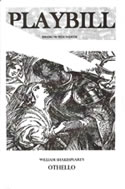 The Brooklyn Tech Theater Company took an even bolder move by turning Othello, the Moor of Venice into Othella, the Butch of Brooklyn. But, as Shauntai Quinlon, who plays the title character, explained in the after-show Q&A, the company—comprised mostly of people of color—wanted to maintain the theme of difference that serves as an undercurrent to the play. Her Othella was as commanding and powerful as any male version of the role. Though this production is set in the timeframe of Don't Ask, Don't Tell, General Othella's gender preference didn't lead to the tragedy; that was strictly the result of Iago's jealousy that Othella had passed him over for promotion.
The Brooklyn Tech Theater Company took an even bolder move by turning Othello, the Moor of Venice into Othella, the Butch of Brooklyn. But, as Shauntai Quinlon, who plays the title character, explained in the after-show Q&A, the company—comprised mostly of people of color—wanted to maintain the theme of difference that serves as an undercurrent to the play. Her Othella was as commanding and powerful as any male version of the role. Though this production is set in the timeframe of Don't Ask, Don't Tell, General Othella's gender preference didn't lead to the tragedy; that was strictly the result of Iago's jealousy that Othella had passed him over for promotion.
Brabantio sets the tone of the play with his genuine distress over his daughter's marriage to Othella; but he swiftly moves from blaming the general to realizing Desdemona (Sumyia Razzak) is the one who has been less than forthcoming. "Look to her, Butch, if thou has eyes to see," he says to Othella. "She has deceived her father, and may thee." In the gay context, this touches on the issue of sexual self-identity, especially in regard to Desdemona: after all, Cassio, with whom Othella believes Desdemona is having an affair, is a man (played by Kevin Tynes). Tiffany Nguyen plays Emilia as an older sister-like friend to Desdemona and one who dotes on her husband, Iago. She is hurt as he literally shoves her aside when she gives him Desdemona's handkerchief, and her screams echo through the theater when she finds Desdemona's body offstage.
The centerpiece performance is Gabriel Morel's as Iago, sucking up to his general while loathing her all the while. His is not a two-faced Iago but an internally screwed up Iago, tightly wound and full of insecurity. Morel also pulls off an admirable escape from a miscue. Because he exited the wrong side of the stage after killing Emilia, Morel can't get to the knife he is supposed to carry back on stage. Othella, then, can't use that knife to stab Iago. Instead, she clobbers him with one punch. On his knees, massaging an apparent broken jaw, seemingly dazed (but perhaps simply realizing that his next line, "I bleed, sir, but not killed" now made no sense), Morel says, "I'm wounded, sir, but not killed."
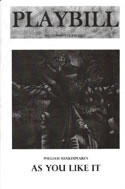 Ms. Tuckman's PD.8 Class's production of As You Like It begs the question, why isn't this play, or any of Shakespeare's comedies, taught in more high schools? Most school curricula limit Shakespeare to Romeo and Juliet, Julius Caesar, Hamlet, and maybe Macbeth. A comedy would show Shakespeare to be fun, too, and this company of teens play As You Like It with infectious humor that has the audience of their peers laughing along, whether it is Touchstone (Jeffrey Jiang) and Audrey (Naomi Francois) discussing her sluttishness or the endearing foursome of Silvius (Benjamin Haye), Phebe (Sunita Chhakowrie), Orlando (Ralph Schneider), and Rosalind as Ganymede (Maria Gershuni) doing the round of "what is love" proclamations.
Ms. Tuckman's PD.8 Class's production of As You Like It begs the question, why isn't this play, or any of Shakespeare's comedies, taught in more high schools? Most school curricula limit Shakespeare to Romeo and Juliet, Julius Caesar, Hamlet, and maybe Macbeth. A comedy would show Shakespeare to be fun, too, and this company of teens play As You Like It with infectious humor that has the audience of their peers laughing along, whether it is Touchstone (Jeffrey Jiang) and Audrey (Naomi Francois) discussing her sluttishness or the endearing foursome of Silvius (Benjamin Haye), Phebe (Sunita Chhakowrie), Orlando (Ralph Schneider), and Rosalind as Ganymede (Maria Gershuni) doing the round of "what is love" proclamations.
Gershuni sees in her Rosalind a chance for the sheltered girl to refashion herself as a completely new person when she takes on the disguise of a boy to flee with Celia (Veronica Polyakov) into the Forest of Arden. She goes from a Rosalind wearing a flowing sundress to a Ganymede in jeans, sleek sports jacket, and cap, and speaking in a Russian accent. This is a completely disguised Rosalind, except when the tardy Orlando finally shows up for their promised rendezvous and Rosalind briefly forgets her Ganymede. She bounds on stage and starts her line in Rosalind's voice before stopping, clearing her throat, and locking down her enthusiasm to continue in her Russian persona.
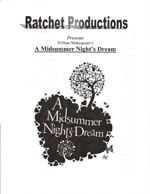 Ratchet Productions ended the day with A Midsummer Night's Dream, and as some directors have tried to capture truth of portrayal in Romeo and Juliet by casting teens in the lead roles, may I suggest a tradition of casting teens as the four lovers. What Hermia, Lysander, Helena, and Demetrius experience in the Athenian woods is not much different from what, respectively, Pamela Ozga, Mikhail Khamarkhanov, Kendra Triblet, and Denzel Lucas experience in the Brooklyn Tech hallways. So, we get the nice touch of Triblet's Helena holding her forefinger and thumb an inch apart to add illustrative insult to Lysander calling Hermia "dwarf," "minimus of hindring knot-grass made," "bead," and "acorn."
Ratchet Productions ended the day with A Midsummer Night's Dream, and as some directors have tried to capture truth of portrayal in Romeo and Juliet by casting teens in the lead roles, may I suggest a tradition of casting teens as the four lovers. What Hermia, Lysander, Helena, and Demetrius experience in the Athenian woods is not much different from what, respectively, Pamela Ozga, Mikhail Khamarkhanov, Kendra Triblet, and Denzel Lucas experience in the Brooklyn Tech hallways. So, we get the nice touch of Triblet's Helena holding her forefinger and thumb an inch apart to add illustrative insult to Lysander calling Hermia "dwarf," "minimus of hindring knot-grass made," "bead," and "acorn."
Puck (Nataliya Blyschak) seems as confused as the lovers, and even Oberon (Harris Van Alterman) and, of course, Titania (Shakela Mitchell) get caught up in the bewildering side effects of their own magic. Ironically, the characters on the most solid ground—at least in their own minds—are Bottom (Isaac Donis, commanding the fairies with aplomb and the occasional eee-awww) and his fellow rude mechanicals. The staging of Pyramus and Thisbe for the court is a hoot. When James Wheaton's Thisbe, wearing a Spanish festival dress and the best application of makeup Brooklyn Tech has probably seen in a long time, slaps at Daniela Shamilova's Wall, Wall punches back. Shawntel Gayle plays Moon with a 'tude. I've seen many a Moon, but this is the first one that bounces the humor right back on the court's hecklers. After Bottom's Pyramus seemingly dies, he jumps up to prolong his speech, causing a startled fright among the courtiers. At the end of the play within the play, Bottom jumps up to offer the epilogue and, again, causes a startled fright among the courtiers.
I think back on the first time I read A Midsummer Night's Dream. It was in college, and I failed to glean much humor in it. Not until I saw it acted a couple of years later did I get the jokes and laugh at the Pyramus and Thisbe sequence. That points to the lasting value of this daylong program of Shakespeare productions. Students were not just reading a poet's words, they were giving flesh to the dramatist's characters and bringing his verse to life and, through that, gaining a greater appreciation of Shakespeare. Another lasting value was how these five productions allowed the audience of their peers and their teachers—as well as this lucky guest—to gain a greater appreciation of Shakespeare, too.
Eric Minton
January 16, 2013
Comment: e-mail editorial@shakespeareances.com
Start a discussion in the Bardroom



 Find additional Shakespeareances
Find additional Shakespeareances